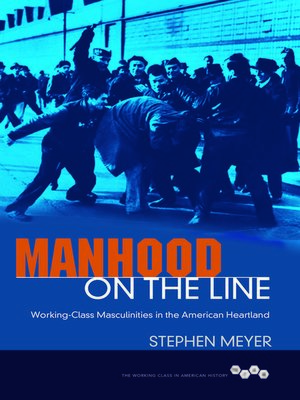Manhood on the Line
ebook ∣ Working-Class Masculinities in the American Heartland · Working Class in American History
By Stephen Meyer

Sign up to save your library
With an OverDrive account, you can save your favorite libraries for at-a-glance information about availability. Find out more about OverDrive accounts.
Find this title in Libby, the library reading app by OverDrive.



Search for a digital library with this title
Title found at these libraries:
| Library Name | Distance |
|---|---|
| Loading... |
Stephen Meyer charts the complex vagaries of men reinventing manhood in twentieth century America. Their ideas of masculinity destroyed by principles of mass production, workers created a white-dominated culture that defended its turf against other racial groups and revived a crude, hypersexualized treatment of women that went far beyond the shop floor. At the same time, they recast unionization battles as manly struggles against a system killing their very selves. Drawing on a wealth of archival material, Meyer recreates a social milieu in stunning detail—the mean labor and stolen pleasures, the battles on the street and in the soul, and a masculinity that expressed itself in violence and sexism but also as a wellspring of the fortitude necessary to maintain one's dignity while doing hard work in hard world.|
Cover
Title
Contents
Preface
Introduction: Forms and Meanings of Working-Class Manhood
1 Lost Manhood: Mass Production and Auto Worker Masculinity
2 Reclaiming Manhood: Shop Culture, Industrial Unionism, and the Derogation of Women, 1920s and 19
3 "Rats, Finks, and Stool Pigeons": The Disreputable Manhood of Factory Spies in the 1920s and 193
4 Fighting to Provide: The Battle to Organize the Ford River Rouge Plant, 1930–1945
5 Fashioning Dense Masculine Space: Industrial Unionism and Altered Shop-Floor Relations, 1935–1960
6 The Female "Invasion": Women and the Male Workplace, 1940–1945 7 The Challenge to White Manhood: Black Men and Women Move to White Male Jobs, 1940–1945
Conclusion: The More Things Change, the More They Stay the Same
Abbreviations
Notes
Index
|
Book of the Year, International Labor History Association, 2016
— International Labor History Association
|Stephen Meyer is an emeritus professor of history at the University of Wisconsin–Milwaukee. His books include The Five Dollar Day: Labor Management and Social Control in the Ford Motor Company, 1908–1921.
|Stephen Meyer is an emeritus professor of history at the University of Wisconsin–Milwaukee. His books include The Five Dollar Day: Labor Management and Social Control in the Ford Motor Company, 1908–1921.







